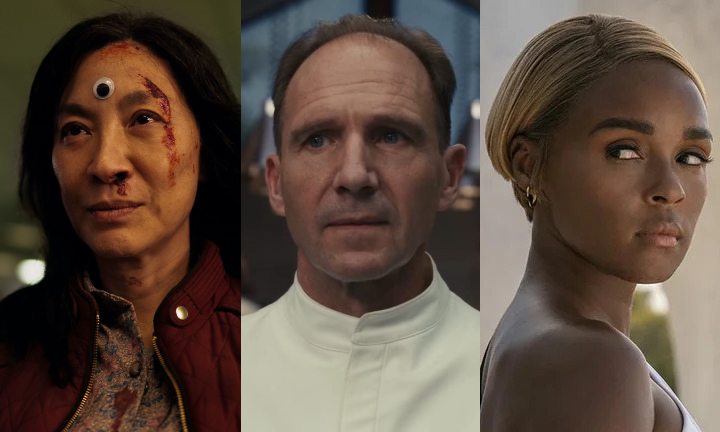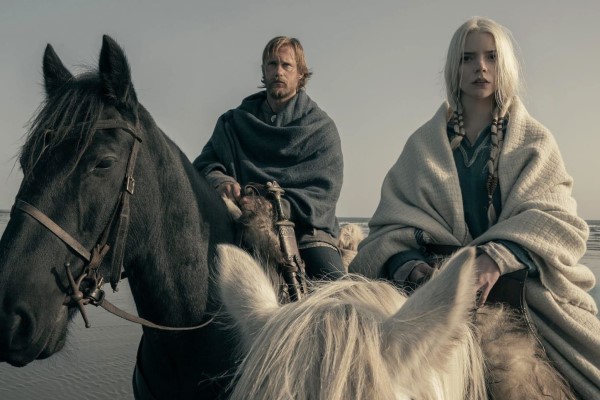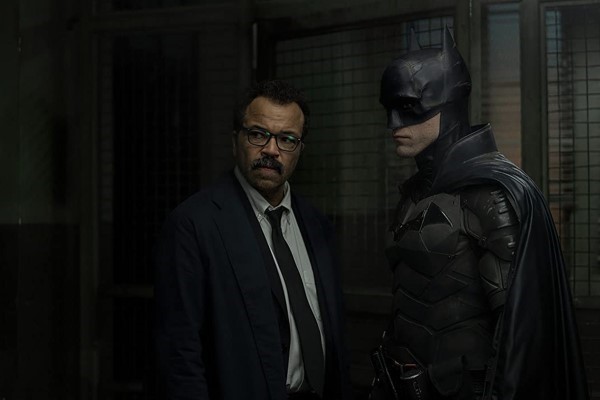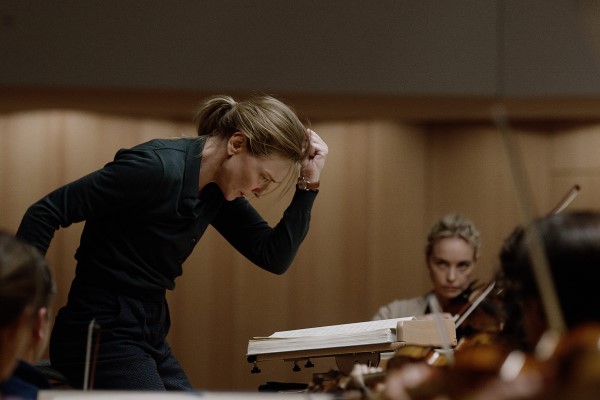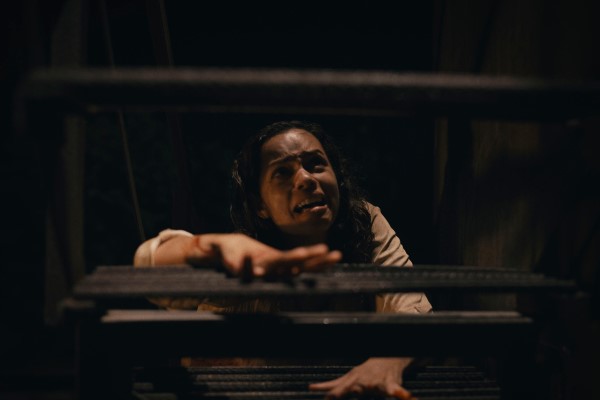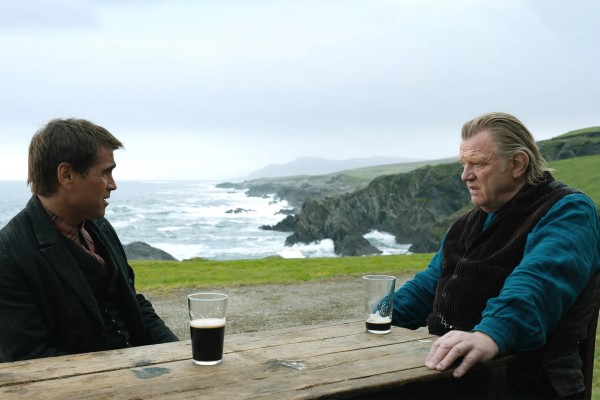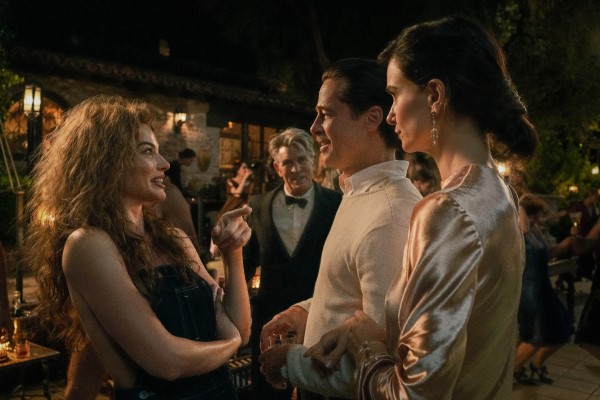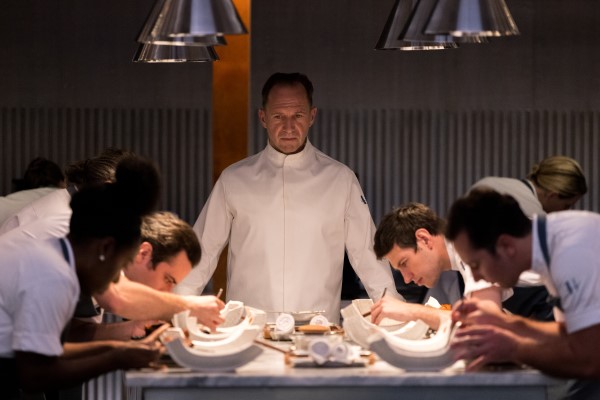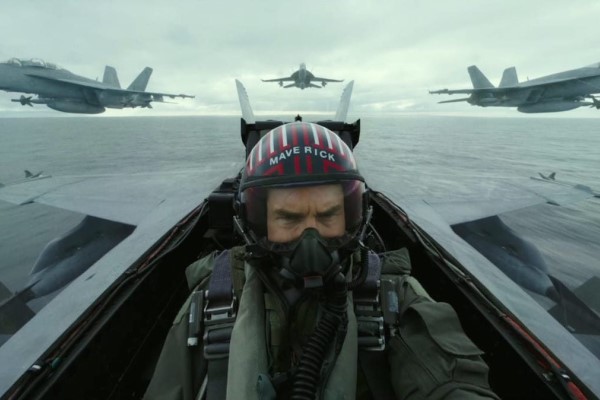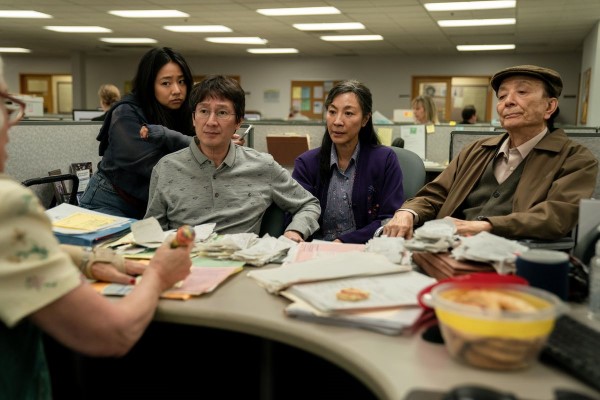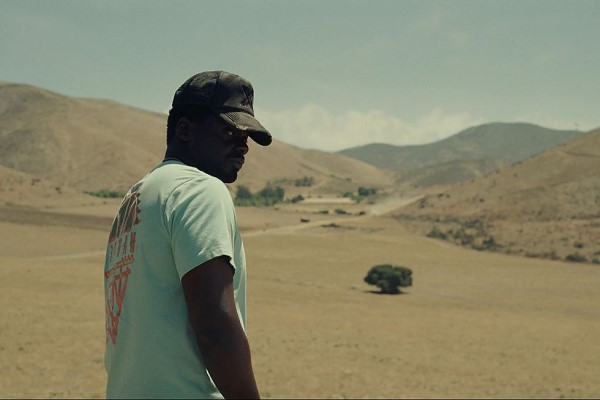Film critics have been sharing their own end-of-year “Best of” lists over the last couple weeks and I’ve been puzzled by some of the reactions. There’s been a lot of negativity if certain popular films don’t make the cut or if some (or many) of the choices are films outside the mainstream. Personally, I don’t get outraged or offended if someone’s “Best of” list doesn’t match my own. On the contrary, my hope is to find films that I may have missed or overlooked. If you’re reading this, I can only hope you share that sentiment. Because these may not necessarily be the “best” movies that hit theaters in the last year, but they were certainly the ones that I liked or connected with the most.
With that, here are my Top 14 Movies of 2022.
14. The Northman
After summoning forces of evil in the woods surrounding a New England farm in the 1630s (The Witch) and driving two lighthouse keepers to madness on a remote island in the 1890s (The Lighthouse), writer-director Robert Eggers turns the clock all the way back to A.D. 895 for The Northman. A king is murdered by his brother, forcing the adolescent heir to the crown to flee his home. But not before vowing to one day return to avenge his father, save his mother, and slay his traitorous uncle. Raised by a band of Vikings, Amleth (Alexander Skarsgard) has forgotten his vow as an adult, until a spiritual encounter with a seeress sets him back on the path of vengeance. Allying himself with a slave who claims to be sorceress (Ana Taylor-Joy), Amleth puts his plan in motion, only to see his perception of the past shattered by a disturbing revelation. The Northman is Eggers’ most ambitious work yet, blending brutal violence, Norse mythology, and breathtaking visuals to deliver a revenge epic for the Viking Age.
Writer(s): Sjón & Robert Eggers
Director(s): Robert Eggers
13. The Batman
A decade removed from the conclusion of Christopher Nolan’s trilogy — the less said about Zack Snyder’s incarnation of the character, the better, though to be clear that is no fault of Ben Affleck’s — the Caped Crusader returned to the big screen, albeit darker, grittier, and more grounded than ever. Gone is the billionaire playboy persona of Bruce Wayne, replaced instead by a Bruce whose public image is defined entirely by his reclusiveness. Writer-director Matt Reeves’s version of Bruce Wayne (played by a suitably brooding Robert Pattinson) is much more comfortable under the cape and cowl than he is playing the part of Gotham City’s favorite son. Two years into his nighttime exploits as Batman, this Bruce sees himself as an instrument of vengeance, more concerned with spreading fear than inspiring hope. But the emergence of the Riddler, a serial killer obsessed with exposing the rampant corruption that has poisoned the city’s political and justice systems, forces Bruce to reconsider his place among the people of Gotham.
Writer(s): Matt Reeves & Peter Craig
Director(s): Matt Reeves
12. Avatar: The Way of Water
I was as skeptical as anyone when it was first announced that James Cameron was planning four sequels to Avatar. The original film was an undeniable success, becoming the highest-grossing film of all time at the worldwide box office. But the 13-year wait for the first sequel, The Way of Water, opened the door for debate as to whether audiences had the appetite to match Cameron’s ambitions. The lesson: Doubt the director of Aliens, T2: Judgment Day, and Titanic at your own peril. The Way of Water is yet another awe-inspiring reminder that no one understands blockbuster filmmaking better than James Cameron. Set more than a decade after the events of the first film, the sequel finds Jake Sully (Sam Worthington) as a fully-integrated member of the Na’vi, having fathered a family with Neytiri (Zoe Saldana). When a familiar foe returns to Pandora and threatens the safety of their children, Jake and Neytiri are forced to embrace a new way of life in order to protect them. The Way of Water does clock in at just over three hours, but final hour is well worth the wait, featuring one breathtaking action sequence after another.
Writer(s): James Cameron & Rick Jaffa & Amanda Silver
Director(s): James Cameron
11. Tár
Tár opens with fictional composer-conductor Lydia Tár (Cate Blanchett) taking the stage for an interview with real-life writer Adam Gopnik at The New Yorker Festival. Gopnik introduces Tár by reciting a detailed description of her accomplishments provided to him by Tár’s assistant (Noémie Merlant), who watches from the gallery, silently mouthing along as if she has committed every carefully chosen word to memory. The opening sequence juxtaposes Gopnik’s recitation of Tár’s biography with the visual of a suit being custom tailored for her, inspired by outfits worn by legendary conductors Claudio Abbado and Tár’s mentor Leonard Bernstein. It is made clear that Lydia Tár is an image, one that has been meticulously crafted. Tár never invites the audience to question the artistic brilliance of its titular character, but the flaws in her character are underlined by the ways she chooses to wield the power and control she has cultivated. It makes for a masterful character study of a woman who has spent her life painstakingly curating a public persona that proves only capable of shielding her from consequences for so long.
Writer(s): Todd Field
Director(s): Todd Field
10. Barbarian
It is ironic that the seed for Barbarian was born from writer-director Zach Cregger’s reading of The Gift of Fear, a self-help book that encourages women to trust their intuition and not brush aside the subconscious red flags that arise in their day-to-day interactions with men. Because Barbarian is engineered to turn your instincts against you. The set-up is rife with red flags: Tess (Georgina Campbell) arrives at her Airbnb late at night only to be greeted at the door by Keith (Bill Skarsgard). The pair surmise that the Airbnb was double booked, putting Tess in the awkward position of either sharing the space with a complete stranger or venturing into the night in search of other accommodations. Again, you may think you know where this is going, but let me assure you: You do not. Much like Tess and Keith after they descend into an unlit tunnel discovered beneath their Airbnb, Barbarian relishes in leaving its audience members stumbling around in the dark, wholly unprepared for the horrors that lie around each corner.
Writer(s): Zach Cregger
Director(s): Zach Cregger
9. Pearl
After a six-year hiatus, Ti West returned to the director’s chair with not but two films in 2022 — and a third in production for 2023. All three are part of the same trilogy, with X being released first and Pearl serving as a prequel. The titular role, first introduced as the murderous antagonist of X, is once again played by Mia Goth, albeit without the makeup and prosthetics that were required for her to play an elderly version of the character in the first film. Taking place in 1918, more than 60 years before the events of X, Pearl trades the Texas Chainsaw Massacre aesthetic of its predecessor for the look and feel of a Technicolor melodrama. Visually, Pearl has more in common with The Wizard of Oz and Mary Poppins than the 70s slashers that inspired X. But much like Pearl herself, there is a darkness buried underneath the vivid color palette. And following in the footsteps of Hereditary‘s Toni Collette and Midsommar‘s Florence Pugh, Goth is the latest actress to make a meal of an A24 horror film. She delivers an iconic performance as a starry-eyed young woman who longs for a more glamorous life far from her family’s farm, only for her true nature to slowly reveal itself as her dreams of stardom begin to slip away from her.
Writer(s): Ti West & Mia Goth
Director(s): Ti West
8. Glass Onion
Writer-director Rian Johnson cited author Agatha Christie as one of the chief influences behind Knives Out, and you don’t have to squint to see that Johnson’s gentleman sleuth Benoit Blanc (Daniel Craig) shares DNA with Christie’s world-renowned Belgian detective Hercule Poirot. Just as Christie dropped Poirot into different locales to solve new mysteries while surrounded by an ever-evolving ensemble of characters (or suspects), Glass Onion sees Blanc transplanted from the Massachusetts mansion of the first film to a private island off the coast of Greece, where billionaire technocrat Miles Bron (Edward Norton) has invited his closest circle of friends for a murder mystery getaway. With Knives Out, Johnson skewered the entitlement of inherited wealth. Here, his dagger is directed toward empty-headed tech billionaires — whose success is built more on claiming credit for brilliant ideas as opposed to actually coming up with them — and the sycophants with which they surround themselves.
Writer(s): Rian Johnson
Director(s): Rian Johnson
7. The Banshees of Inisherin
Set on a fictional isle off the coast of Ireland, against the backdrop of the Irish Civil War in 1923, The Banshees of Inisherin begins with the end of a friendship. Colm Doherty (Brendan Gleeson) delivers the news to Pádraic Súilleabháin (Colin Farrell) that he no longer wishes to be his friend, explaining that he believes their days spent engaging in idle conversation over a pint at the pub have been a waste. Colm’s abrupt decision to sever their friendship is rooted in an existential crisis: Suddenly conscious of the finite amount of time he has left on this earth, Colm resolves to spend the rest of his days focusing on his folk music in the hopes of creating something that will last long after he has shuffled off this mortal coil. Pádraic is understandably shaken by the dissolution of their longtime friendship and it soon becomes clear how empty his own existence is without Colm’s companionship as its anchor. Inisherin comes to feel like a purgatory of sorts, where a collection of souls search desperately for respite from the inescapable loneliness that seems to lurk in every dark corner of this remote island.
Writer(s): Martin McDonagh
Director(s): Martin McDonagh
6. X
Sex has long been a harbinger of death in the slasher genre, with the role of the “Final Girl” often being reserved for whichever female character manages to survive with her virginity intact. There are no virgins to be found in X, writer-director Ti West’s long-awaited return to the horror genre, and sex is front and center. Sex is a means to an end for the amateur film crew that absconds to a remote Texas farm to shoot a porno that each of them hopes will be a stepping stone to a better life. Their zeal for what the future may hold in store stands in stark contrast to the mournful air that shrouds the farm’s residents, an elderly couple who look to the past with bitterness and regret. Before long, their visitors “flaunting” their sexuality begins to seem like an affront — and that is when the bloodletting begins. X is a throwback slasher that will you make you alternately laugh, wince, and gasp, but it is Mia Goth’s dual performances — one of which you may not even be aware of until the end credits — that leave the most lasting impression.
Writer(s): Ti West
Director(s): Ti West
5. Babylon
Whenever Hollywood produces a movie about Hollywood, there is a tendency to dismiss it as self-congratulatory navel-gazing. “A love letter to cinema” has become a common refrain for describing these types of films, though it may be accompanied with an eye-roll in some circles. But a love letter to cinema Babylon is not. That’s not to say it does not awe at the power of cinema, which it believes to be a means of immortality, offering those behind and in front of the camera the opportunity to create an imprint of themselves that will live on long after they’ve gone. As is always the case, immortality comes at a price. It’s a bill that comes due for the three central figures of Babylon: Jack Conrad (Brad Pitt), a silent film star at the height of his powers; Nellie LaRoy (Margot Robbie), a starlet seeking to forge her own rags-to-riches story through sheer force of will; and Manny Torres (Diego Calva), an ambitious Mexican-American film assistant who rises through the studio ranks. Set in the late 1920s and charting Hollywood’s transition from silent to sound films, Babylon is about the warmth of the spotlight and the cold inevitability of being asked to exit stage left when the time comes to make room for whoever comes next.
Writer(s): Damien Chazelle
Director(s): Damien Chazelle
4. The Menu
If you’ve ever been to a high-end restaurant where you felt like you were paying more for less or you weren’t sure whether the food was meant to be photographed rather than eaten, then you’ll understand where The Menu is coming from. Twelve hand-picked guests are ferried to dine at an exclusive restaurant on a private island owned by celebrity chef Julian Slowik (Ralph Fiennes), though one of the guests (Anya Taylor-Joy) is not like the others. She begins to sense, with growing unease, that Slowik may not have the best of intentions for his assembled guests, many of whom seem to share a past connection with the chef. The Menu skewers the way fine dining has become a feeding ground for status-obsessed elites, taking aim at everyone from the self-important food critic to the deep-pocketed “regulars” who couldn’t care less about what is on the plate in front of them. It is a brutally efficient and darkly comic satire anchored by a restrained performance from Fiennes, who makes clear that Slowik’s own self-loathing is matched only by his utter disdain for the people that have contributed to today’s insufferable foodie culture.
Writer(s): Seth Reiss & Will Tracy
Director(s): Mark Mylod
3. Top Gun: Maverick
When we meet Capt. Pete “Maverick” Mitchell again more than 30 years after the events of the first film, he is presented as a dinosaur fighting tooth and nail to ward off extinction, assured by an admiral that unmanned aircraft are all but certain to render his kind obsolete. It’s not difficult to see the parallels between the titular pilot of Top Gun: Maverick and the mega star returning to the role that helped catapult him to movie stardom. Tom Cruise would seem to be one of the last vestiges a bygone era when studio executives believed that the most important part of a movie poster was the name above the title. Is there still a place for an old school action hero like Cruise in a landscape dominated by CGI superheroes trading blows in front of a green screen? Top Gun: Maverick — along with a Mission: Impossible franchise that has improbably improved with age — answers in the affirmative. Just as Maverick is brought back to teach a generation of pilots in a way only he can, Top Gun: Maverick is Cruise delivering thrills in a way only he can, with some of the most exhilarating action sequences ever put to film.
Writer(s): Ehren Kruger and Eric Warren Singer and Christopher McQuarrie
Director(s): Joseph Kosinski
2. Everything Everywhere All At Once
Whether they are willing to admit or not, everyone has looked in life’s rearview mirror at one point or another and asked themselves, “What if?” We’ve all come to a crossroads and made our choice, later wondering what became of the version of ourselves that walked the other path. The multiverse of Everything Everywhere All At Once — which Chinese-American laundromat proprietor Evelyn (Michelle Yeoh) is called upon to save from an existential threat — is built on the idea that a universe exists for every path. But the infinite possibilities of the multiverse can be paralyzing and the weight of it all can crush you, as Evelyn comes to learn after she starts connecting with her alternative selves to acquire their skills in her fight against the evil “Jobu Tupaki.” Everything Everywhere All At Once, which is itself bursting at the seams with enough ideas and imagination to leave your mind buried underneath it all, is about recognizing our own insignificance in the face of a vast universe and how to find meaning in a meaningless universe. You can surrender to nihilism or embrace the opportunity to define for yourself what matters most in life.
Writer(s): Daniel Scheinert & Daniel Kwan (a.k.a. Daniels)
Director(s): Daniel Scheinert & Daniel Kwan (a.k.a. Daniels)
1. Nope
Nope opens on the set of a late 90s sitcom, though the live studio audience has fled their seats and all that remains is the dead quiet of a soundstage soaked in the blood and carnage from a violent outburst that largely occurs off screen. One of the survivors is a child actor who grows up to be the proprietor of a small-time California Gold Rush theme park called Jupiter’s Claim, where he is asked about this incident from his childhood. But rather than relive this traumatic memory, he references the Saturday Night Live comedy sketch that it inspired, seemingly numb to the fact that this horror from his past quickly became fodder for entertainment. Audiences are drawn to spectacle, no matter how horrifying it may be, with rarely a thought wasted on what it may have cost the people involved — and what it may ultimately cost the viewer. Which is why the siblings at the center of Nope seek to record the U.F.O. they believe to be lurking in the clouds above their horse ranch in the hills outside Hollywood. For them, it’s their ticket to fame and fortune. The challenge is surviving with enough of yourself intact for it to have been worth it.
Writer(s): Jordan Peele
Director(s): Jordan Peele
Just a Bit Outside (in alphabetical order): After Yang; Ambulance; Bros; Confess, Fletch; Cha Cha Real Smooth; Crimes of the Future; Deadstream; Dual; The Fabelmans; Master; Resurrection; Scream; She Said; Vengeance; Violent Night; Watcher; White Noise; The Woman King; and Women Talking
